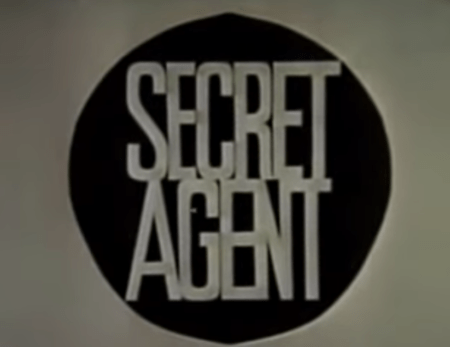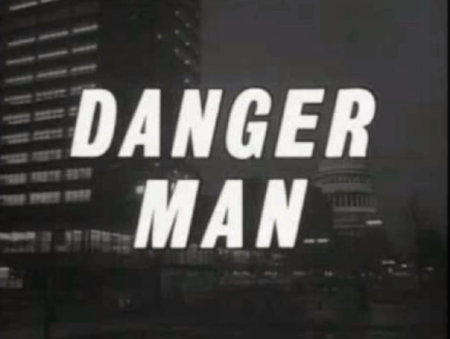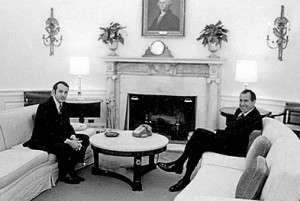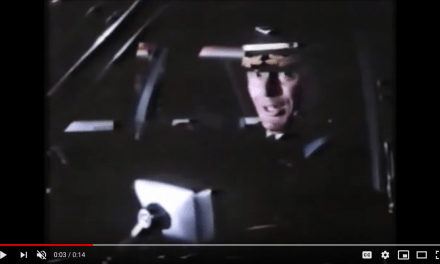Do new perspectives become more shocking the further you get through life? Unsettling? Like having a carpet yanked out from under you? Probably by somebody who is rightly reminding you that you’ve had that carpet since around 1977 and it’s really about time you bought a new one.
That happened to me this week. Thanks to a podcast.
The podcast in question is called ITC Entertained the World and I think it’s rather brilliant. It’s a discussion show that focuses on the film series financed by ATV in the 1960s and 1970s – which, I’m rather partial to – and offers me a solid 75 minutes or so of rumination and education that has clearly been prepped within an inch of its life [i]. It’s not just the usual suspects that it looks at either. No, while I dabble around with the obvious, easy picking like about The Prisoner (1967-1968), these guys are onto the hard stuff, mainlining doses of Gideon’s Way (1964-1966) right from the off.
Anyway, this week they were looking at Danger Man (1960-1961)… and, yes, I do mean Danger Man (1960-1961) and not Danger Man (1960-1967) [ii]. And one of the hosts – Jaz Wiseman – talks eloquently at length about how ITC product was a success on the American networks.
And that threw me for a moment. To the extent that I even slopped my coffee. Lost a fair bit – easily mopped up. Low on milk, so no need for any tears. Around 50% left. See – I even gauge my drinks as data.
The thing is, I’ve always looked at ITC distributed series as never quite making it on the networks as much as you’d hope. But Jaz confronted me – and the other listeners – with some very persuasive facts. The sort that Lord Brett Sinclair and Danny Wilde would have been proud of. And – with notable loss of Americano with Caramel Pecan – I realised that he’s right. And while the new perspective I’ve suddenly been confronted with has infinitesimally increased Kenco’s annual profits, more importantly I wanted to understand why I had ended up with my original perspectives in the first place.
My view on the level of American network success is probably comparatively easy to explain and indicates that I’ve spent far too much time engrossed in volumes on Television Drama Series Programming by Larry James Gianakos or revising those Fall Season tables at the back of Brooks and Marsh’s The Complete Directory to Prime Time Network and Cable TV Shows, 1946-Present [iii]. As such, I’ve always felt that anything from the UK being snapped up and placed between 7pm and 11pm on ABC, CBS or NBC was something of a rarity with only a fraction of the ATV film series getting this accolade. And when they do, often merely as a ‘second season’ or a summer replacement filler for another show that’s tanked during the Fall or been cancelled come the spring.

Fig 2: His name is still Drake, John Drake. But the name of his series seems to have changed for the purposes of a transatlantic sale.
Across the period of 1959 to 1981 when ITC were distributing first-run UK film series [iv], there were – as far as I can see – only four ATV film series make it to the networks in the Fall. The anthology Espionage (1963-1964) was carried by NBC for a full year from Fall 1963. Secret Agent (1965-1966) – or what we know in the UK as Danger Man (1964-1967) [v] – appeared as a replacement on CBS in April 1965 and did well, running through the summer and so continuing with new episodes as part of the Fall 1965 season right the way through to April 1966. Yes – that was a very big deal. Then in Fall 1971 there’s a double hit with ABC – The Persuaders! (1971-1972) runs for the whole season while Shirley’s World (1971-1972) gets its cancellation very quickly but limps on into the New Year. So, that’s just four.
And as far as I can tell, things like Jason King (1971-1972) didn’t make it to the USA [vi] and nor did The Sentimental Agent (1963) or Shillingbury Tales (1981).
I mean… yes, okay… there is a batch of summer replacements and ‘second season’ fare. But not that many, surely? Well – thirteen or so [vii]. Is that a lot? And you’ve got the Supermarionation shows. Admittedly, Fireball XL5 (1962-1963) is networked on NBC on Saturday mornings from Fall 1963 for two years… but the rest of the SF output from the same studios [viii] is only syndicated (and The Secret Service (1969) never seemed to show up in the US at all).
A couple of mini-series also made primetime; CBS aired Moses – The Lawgiver over the summers of 1975 and 1979, while NBC screened Jesus of Nazareth (1977) – as advertised by the Pope [ix] – various Easters from 1977. Return of the Saint (1978-1979) was buried by CBS as part of its post-primetime CBS Late Movie slot from late 1979. The Protectors (1972-1974) and The Adventurer (1972-1973) were made to fill the Prime Time Access Rule requirements anyway and so were never intended for the networks. And there’s at least another eight film series in syndication [x].
![Fig 3: A scene from the rare cross-over/team-up two-parter Nightmare at Nutwood for The Persuaders! and The Adventures of Rupert Bear [xi]Fig 3: A scene from the rare cross-over/team-up two-parter Nightmare at Nutwood for The Persuaders! and The Adventures of Rupert Bear [xi]](https://cstonline.net/wp-content/uploads/2020/05/WhatHasITCEverDoneForTheUS_image03-450x288.png)
Fig 3: A scene from the rare cross-over/team-up two-parter Nightmare at Nutwood for The Persuaders! and The Adventures of Rupert Bear [xi]
So I’m looking at only around 10% of ATV film series making it into the Fall schedules and just under 20% not appearing in the US at all with a further 36% kicking around largely ignored in syndication. And that doesn’t look impressive to me…
But, I’m on the wrong side of the pond – like looking down the wrong end of the telescope. Thus British TV looks smaller rather than bigger. Fly back to the side I should be on, where I am physically now and look at how many British shows make it onto the Networks… and I can’t think of many that aren’t ATV film series marketed by ITC. 80% of them do make it in one way or another.
And In the 1960s and 1970s, the only other British network non-variety shows that I can think of off-hand are ABC’s The Avengers (1961-1969) airing on ABC [xii], Hammer’s Journey to the Unknown (1968-1969) also on ABC, BBC2’s The Six Wives of Henry VIII (1970) as a summer 1971 replacement on CBS, ATV’s The Strauss Family (1972) on ABC over summer 1973, and some of ATV’s Thriller as part of ABC’s Wide World of Entertainment running post-primetime from New Year 1973 [xiii].
And all of a sudden, if I’m looking at the handful of shows that do make it from the UK to the US, I realise that out of those six shows that do end up on the primetime Fall schedules, four of them are from ITC. Furthermore, reading all those footnotes, there’s a slew of other shows in other non-Fall or non-primetime slots. And in a flash, I’m seeing the world through Jaz’s eyes. And I’m going ‘WOW! That’s amazing!’
The fact of the matter is that I’m sitting here looking at what’s left of my coffee. I’ve been seeing it as half empty. People like Jaz demonstrate to me how to see it as half full.
And maybe next time, it’ll save me a lot of time if I just assume I’m wrong in the first place. It’d certainly have saved a lot of your time.
Andrew Pixley is a retired data developer. For the last 30 years he’s written about almost anything to do with television if people will pay him – and occasionally when they won’t. Possibly if he spent less time trying to think of supposedly smart ways to end these biographical things, then he wouldn’t have these problems with his approach to a sense of proportion in the first place. You can but hope, can’t you?
Footnotes
[i] Other approaches to podcasts are available.
[ii] i.e. the half-hour shows rather than the whole thing including the later one-hour reboot from 1964 onwards.
[iii] … or whenever Present was.
[iv] For the purposes of this exercise, I’m considering ITC as the organisation wholly acquired and rebranded by ATV in October 1959 when Danger Man had just started production and the final UK film series to be Shillingbury Tales made in 1980 and broadcast from 1981.
[v] Did you read [ii]? If you did, you’ll know what I’m talking about here.
[vi] As far as I’m aware. But this is where we need your help. Were you living in the USA in the late 1970s? Did you tune to a local station at off-peak times? Can you remember seeing a programme with that moustachioed bloke from Department S (1969-1970) but looking a lot, lot grainier? Have you encountered people who try to sound like Shaw Taylor?
[vii] Danger Man (1960-1961) debuted on CBS in April 1961 and had a partial run through the summer, while Sir Francis Drake (1961-1962) set sail on NBC across summer 1962 apparently as The Adventures of Sir Francis Drake. The Baron comes in as a ‘second season’ show in January 1966, but no new episodes are ordered by ABC after a few weeks and it fizzles out in the coming months. Court Martial (1965-1966) airs most episodes across spring/summer 1966 on ABC. Following syndication in monochrome, the colour exploits of The Saint (1962-1969) air on NBC in spring/summer 1967, a few weeks in spring 1968 and again briefly in spring 1969. About half of Man in a Suitcase (1967-1968) pops up on ABC in spring/summer 1968, while The Champions (1968-1969) is found on NBC for a few weeks during summer 1968. The Prisoner is taken by CBS in summer 1968 and is even repeated in summer 1969. Strange Report (1969-1970) plugs the NBC New Year 1971 schedule some three years after it was made, shortly after which From a Birds Eye View (1970-1971) limps onto the same network. The Zoo Gang (1974) finally shows up on NBC in July/August 1975.
[viii] Supercar (1961-1962), Stingray (1964-1965), Thunderbirds (1965-1966), Captain Scarlet and the Mysterons (1967-1968) and Joe 90 (1968-1969) all ended up syndicated.
[ix] Yes, really!
[x] Languishing in syndication, you could find Ghost Squad (1961-1962), Man of the World (1962-1963), Gideon’s Way alias Gideon… CID, Department S, Randall and Hopkirk (Deceased) (1969-1970) rebranded as My Partner the Ghost, UFO (1970-1971), Space: 1999 (1975-1977) and Hammer House of Horror (1980).
[xi] No, not really
[xii] …and by that, I mean the US ABC (American Broadcasting Company) network and not the UK ABC (Associated British Corporation) who made it.
[xiii] I’m not counting The Ugliest Girl in Town (1968-1969) or those odd episodes of One Step Beyond (1959-1961) shot in Borehamwood or chunks of The Man Who Never Was (1966-1967) as being British; although filmed wholly or partially in the UK, they were made by American companies as far as I can tell. And as for all the variety stuff, you know, I have to admit that ATV doesn’t do badly on the videotape front either what with The Engelbert Humperdinck Show (1969-1970), This Is… Tom Jones (1969-1971), The John Davidson Show (1969-1970), The Val Doonican Show (1970-1975) or The Marty Feldman Comedy Machine (1971-1972). And there’s The Liberace Show (1969) on CBS. And that’s even before we get anywhere near things like Spotlight (1967) on CBS or whatever editions of The Des O’Connor Show (1963-1971) make it into strands like NBC’s Kraft Music Hall (1958-1971) or The Morecambe and Wise Show (1961-1968) repackaged as ABC’s Piccadilly Palace (1967) or stuff like Showtime (1968) on CBS or Kopykats (1972) being part of The ABC Comedy Hour (1972) or …






